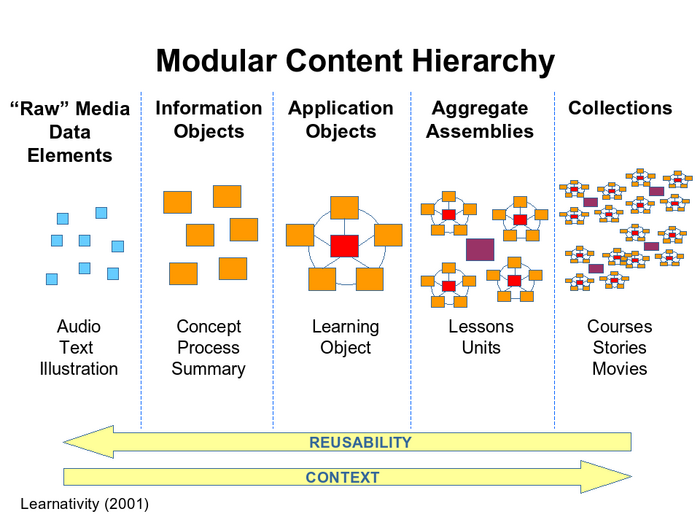
We should work smarter, not harder. Time allocation and management strategies have a direct effect on the quality of your courses and student success. Digital accessibility should be improved continuously from one semester to the next. Creating course materials that are accessible and continuing to improve their accessibility can be time-consuming. However, when content is produced with a purpose in mind, it leads to greater utility and longevity. The more you can reuse it, the more useful it will be.

Granularity of digital resources refers to the size and extent to which the item is used. The aggregation level often defines and determines the reusability. Typically, "raw" elements (e.g. images) and the immediate resulting learning objects that focus on a single concept or process are more useful. They can be further assembled and used to create different lessons. Textual content is less portable; it is less likely that you can use the entire theme again for a different purpose or in another class.
When you prepare course elements, regardless of the delivery method, it is important to consider all modalities. Hence, resources for F2F can be used Online or vice versa to avoid diminishing returns. Otherwise, you may have to spend extra time to repeat your work in a different format. For example, a traditional handout, in the case of a Flex course, is not suitable for Online students. Instead an accessible file could be uploaded to Canvas as you build the course for ALL students.
Before you decide to prepare an element, understanding the available technologies can be very helpful. For example, Ally can convert an accessible Word or PDF file to some alternatives. Therefore, text-based formats become your focus. For a Flex course, consider the live F2F and Sync Online session. You can simply set the automatic record function or press the record button. The video can be shared with Online students at a later time as a resource. All students then may refer to a segment to start a discussion or complete a self-reflection exercise.
Unfortunately, due to FERPA, these unedited recordings cannot be reused for other courses. This doesn't mean that you have to continue to create content alone. Educators across the country share your experience. Many dedicated instructors like yourself make the effort to share their content and create better learning experience for students. As long as you are abide by the conditions, Creative Commons licenses allow you to keep, reuse, revise/improve, remix, and redistribute their work, and it protects you from concerns of copyright infringement. Check out the Commons on the Canvas global navigation menu!




